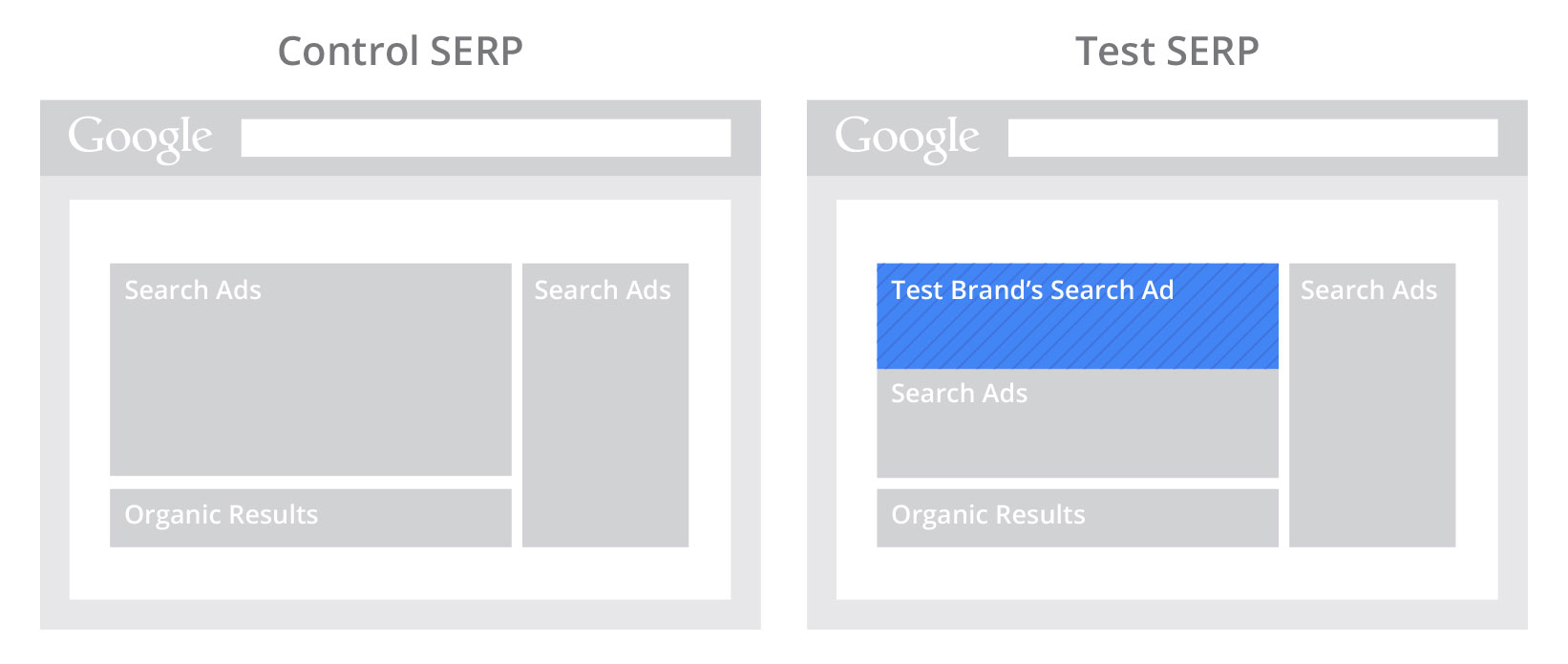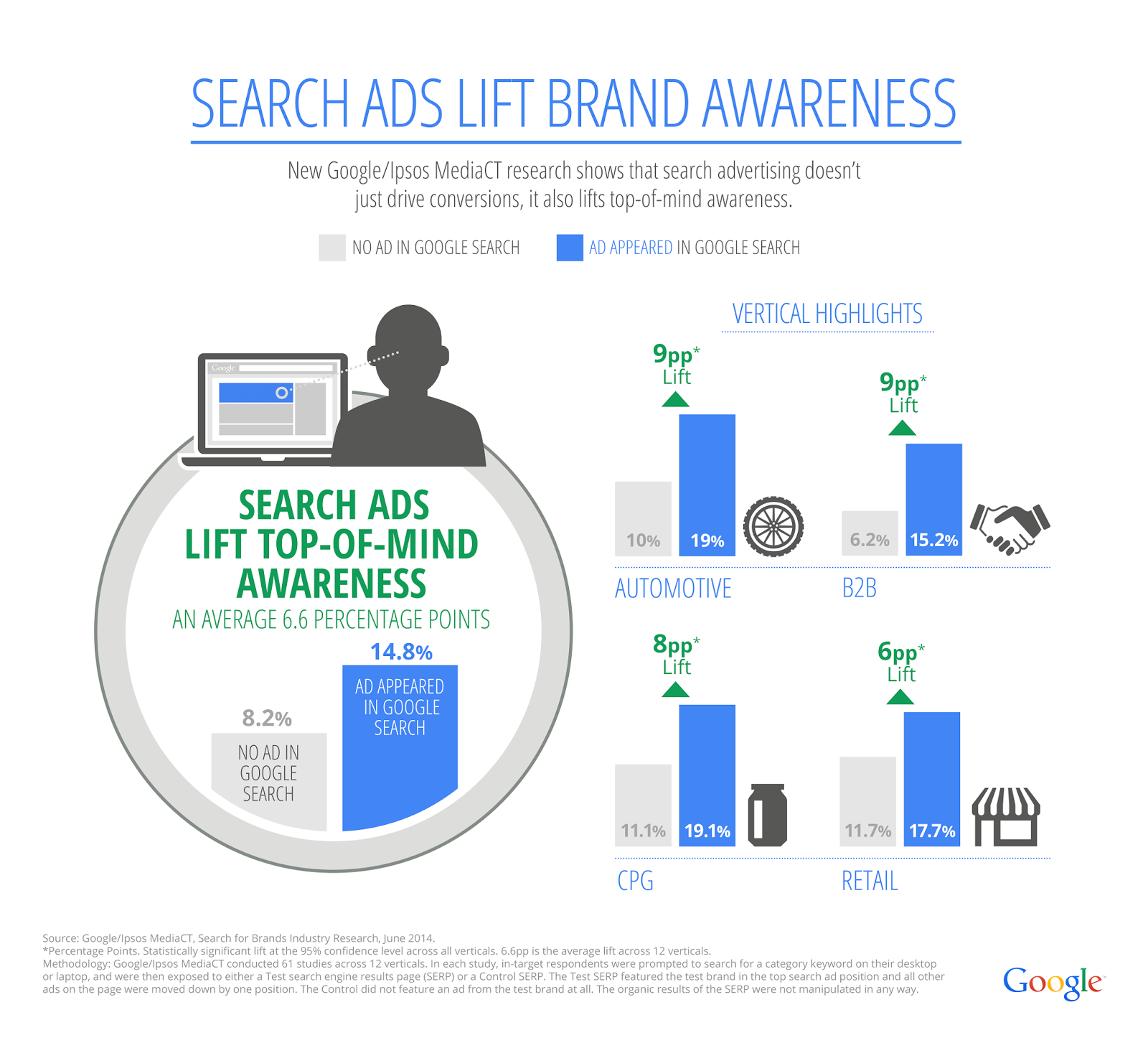Google & Ipsos Study: Search Ads Increase Brand Awareness

Google and Ipsos MediaCT, the market research division of Ipsos, have partnered to conduct 61 simulated search experiments throughout 2013 to identify and measure the impact of search advertising on brand awareness. During these experiments, they found out that search ads have a positive impact on top-of-mind awareness and unaided brand awareness.
-
Methodology of the Study
For each of the 61 simulated search experiments, 800 U.S. respondents were chosen to participate based on the advertiser’s specific target criteria. The respondents were instructed to conduct searches on Google for a specific category keyword (e.g. “hiking boots” or “small cars” as per Google’s example). The result page displayed was either a control page, which was not manipulated, or a test page featuring the test brand in the first position of the search ad, as seen on the visual below.

The respondents were then asked to name the first brand that came to their mind for the category keyword tested.
This methodology was used to measure the search ads impact on brand awareness across 12 different industries, specifically:
- Apparel and durables
- Automobile
- B2B
- Classified and local
- Consumer packaged goods (CPG)
- Education
- Financial services
- Healthcare
- Media and entertainment
- Retail
- Tech
- Travel
-
Results of the study
Top-of-mind brand awareness
Overall, when asked to name the first brand to mind when thinking about a specific category keyword, 14.8% of the test group respondents mentioned the test brand, versus 8.2% in the control group. The exposure to the test brand’s ad generated a 6.6 points increase in top-of-mind awareness. The average increase top-of-mind awareness was calculated for each vertical with 5 or more studies conducted:
- Automobile: +9 points
- B2B: +9 points
- Consumer packaged goods (CPG): +8 points
- Retail: +6 points
Google published the following visual to summarize its findings:

It is worth noting that these results were attained even if the respondents did not click on the ads of the tested brands.
Unaided brand awareness
This time respondents were prompted to name up to four different brands related to the category keyword tested. Overall, the unaided brand awareness reached 26.7% in the test group, versus 17.5% in the control group. The exposure to the test brand’s ad generated an increase of 9.2 points in unaided brand awareness. Google and Ipsos MediaCT did not disclose any industry-specific metrics.
-
Search Ads’ relation to brand awareness
Google attributes this increase in brand awareness to the fact that consumers are exposed to the brands’ ads either during their research prior to a purchase, or directly while shopping. By being visible to consumers when they are the most interested in the product and are in a “highly receptive mindset”, brands have an opportunity to associate themselves with general category keywords. And as the experiments have shown, this association does not necessarily require the consumers to actually click on the ads. Considering that many search ads campaign are using a CPC model (cost-per-click, i.e. advertisers only pay when consumers click on their ads), brands benefit from an increased brand exposure and awareness for free as long as the ads are not clicked.
The main benefits of search advertising campaigns still remain to generate click-through and drive conversions (see how we integrate it in our P.A.C.E. digital marketing model to drive traffic and convert visitors at different stages of the buying cycle), but this study allows Google to highlight additional benefits of the advertising medium, and to compare it with more traditional advertising media such as TV or print ads focusing on brand awareness metrics.
Independently from your search advertising campaigns objectives, raising brand awareness or driving conversion, Smartt offers a Search Engine Marketing audit that highlights your campaigns optimization opportunities, as well as a digital marketing training that covers the essentials of running effective Adwords campaigns. If you want to learn more about search advertising, feel free to refer to our blog’s search advertising category, or check out one of our recent article on the topic: How to increase your ads’ click-through rate (CTR) by as much as 241% with these 3 ad extensions. For more information, get in touch with us through our contact page, or on Twitter.


